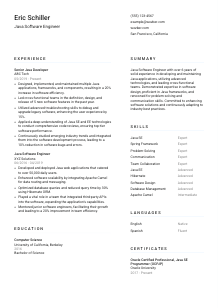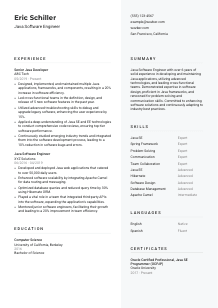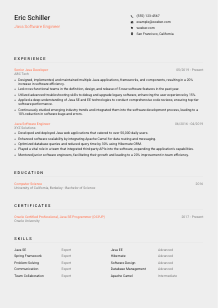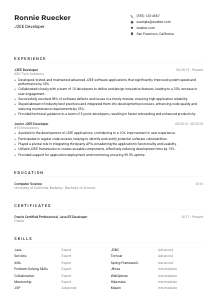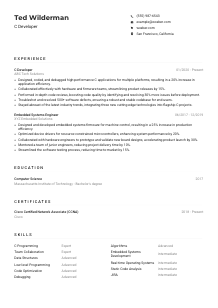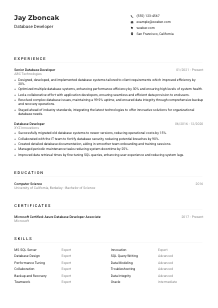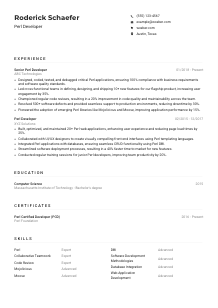Java Software Engineer Resume Example
Weaving code like a master, but your resume seems stuck in an infinite loop? Delve into this Java Software Engineer resume example, crafted with Wozber free resume builder. Learn how to align your software solutions with job requirements, programming an outstanding career at full speed with Java!
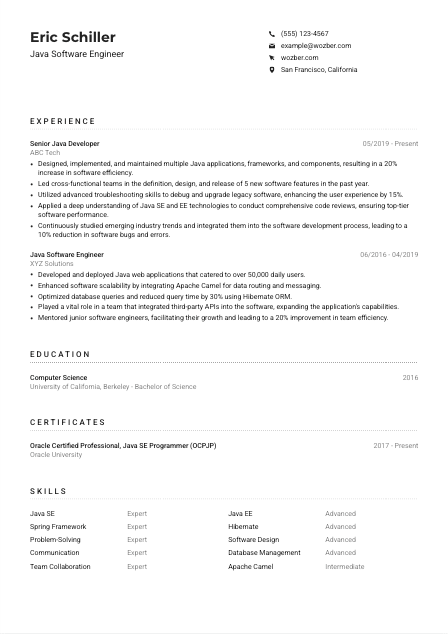
How to write a Java Software Engineer resume?
Hello, aspiring Java Software Engineer! Preparing to dive into the competitive job market requires not just skill, but strategy. The magic wand in your quest? A meticulously crafted resume that speaks directly to your dream job's heart.
With the help of Wozber's free resume builder, this guide will navigate you through the art of tailoring your resume specifically for a Java Software Engineer position. Get ready to unlock the door to your next career milestone with a resume that's not only ATS-compliant but undeniably persuasive.
Personal Details
In the Java world, details matter. The Personal Details section of your resume is where the initial handshake happens. Let's refine it to ensure your introduction speaks volumes and aligns flawlessly with the Java Software Engineer role requirements.
1. Name as Your Brand
Think of your name as the class name in Java: clear and significant. Use a font that's easy to read, akin to selecting a straightforward syntax for better understanding.
2. Job Title Alignment
Under your name, specify your targeted job title - in this case, "Java Software Engineer." It's like declaring your main method in Java; it tells the hiring manager exactly what you're programmed to do.
3. Critical Contact Points
- Phone Number: Ensure it's updated. A missing digit could be like a syntax error, causing unexpected outcomes.
- Professional Email Address: Opt for a sensible email format, akin to keeping your code clean and readable.
4. Location Relevance
Mentioning "San Francisco, California" as your location directly aligns with one of the job's prerequisites, eliminating any doubts about potential relocation hurdles.
5. Online Profile Inclusion
Adding a LinkedIn profile or a personal portfolio website is like a URL to your professional Git Repository; it provides a direct link to your achievements and contributions.
Takeaway
The Personal Details section is more than formalities; it's your first opportunity to match the job's need with precision. Ensure each detail serves a purpose, mirroring the way every Java annotation serves its use.





Experience
For a Java Software Engineer, your experience section is crucial. It's where you get to showcase the algorithms you've designed, the bugs you've squashed, and the deployable features you've developed. Let's ensure your experience not only catches the eye of the hiring manager but also passes the ATS scan with flying colors.
- Designed, implemented, and maintained multiple Java applications, frameworks, and components, resulting in a 20% increase in software efficiency.
- Led cross‑functional teams in the definition, design, and release of 5 new software features in the past year.
- Utilized advanced troubleshooting skills to debug and upgrade legacy software, enhancing the user experience by 15%.
- Applied a deep understanding of Java SE and EE technologies to conduct comprehensive code reviews, ensuring top‑tier software performance.
- Continuously studied emerging industry trends and integrated them into the software development process, leading to a 10% reduction in software bugs and errors.
- Developed and deployed Java web applications that catered to over 50,000 daily users.
- Enhanced software scalability by integrating Apache Camel for data routing and messaging.
- Optimized database queries and reduced query time by 30% using Hibernate ORM.
- Played a vital role in a team that integrated third‑party APIs into the software, expanding the application's capabilities.
- Mentored junior software engineers, facilitating their growth and leading to a 20% improvement in team efficiency.
1. Deconstruct Job Requirements
Start by identifying the key requirements from the job posting. This will be our guideline for picking which experiences to highlight, similar to how you'd choose which libraries to use for a specific project.
2. Company and Role Structure
Organize your professional experience chronologically. Think of each job as a new release version, showcasing growth and improvement over time.
3. Accomplishment Statements
Highlight your achievements with quantifiable outcomes when possible. Just as Java allows for the creation of robust, scalable applications, your accomplishment statements should communicate your impact.
4. Numerical Proof
Whenever possible, bolster achievements with numbers. Increased efficiency by 20%? Reduced bugs by 10% annually? These are the metrics that make your contributions concrete.
5. Relevant Experience Only
Much like unnecessary imports can clutter your code, irrelevant experience can burden your resume. Stay focused on what matters to the role of a Java Software Engineer.
Takeaway
Your experience section should be a testament to your journey as a Java Software Engineer. Tailor it to reflect your proficiency in coding, collaboration, and creating solutions that resonate with the job description.
Education
The foundation of every great Java Software Engineer is a solid education in computer science or a related field. Let's make your education section as compelling as your coding skills, underscored by relevance and precision.
1. Highlight Degree Requisite
The job asks for a Bachelor's degree in Computer Science or a related field. Make sure this is clearly stated, mirroring the explicit type declaration in Java.
2. Simplified Structure
Lay out your educational background cleanly, akin to organizing your classes and packages for easy navigation.
3. Degree Specificity
Align your degree closely with the job specifications. For our position, a 'Bachelor of Science in Computer Science' matches the job description perfectly, reinforcing your suitability.
4. Relevant Coursework
Include pertinent courses if they add value, especially for early-career professionals. This is similar to importing the right packages for your Java application.
5. Additional Academic Achievements
Highlight any honors, relevant clubs, or major projects if they demonstrate skills or knowledge pertinent to the role of a Java Software Engineer.
Takeaway
Treat your education section as the framework that supports your career goals. Ensure it aligns with the employer's requirements, cementing your status as a top candidate.
Certificates
In the evolving tech landscape, certifications can significantly bolster your qualifications as a Java Software Engineer. They reflect continued learning, expertise, and commitment to your craft. Let's ensure your certificates showcase your edge.
1. Identify Job Essentials
First, understand the certifications the job description highlights or implies. While the posted job does not explicitly require certificates, having relevant ones like the 'Oracle Certified Professional, Java SE Programmer' can set you apart.
2. Choose Pertinent Certificates
Include certifications that demonstrate your depth of knowledge in Java and associated technologies. Quality trumps quantity; select those that strengthen your application.
3. Date Relevance
For certifications, especially in technology, the acquisition date can be pivotal. It shows you are up-to-date with the latest technological advancements.
4. Continuous Learning
Emphasize your commitment to professional growth by regularly updating certifications and pursuing new learning opportunities that align with your career in Java development.
Takeaway
Certifications can enhance your resume by demonstrating specialized knowledge and a commitment to your profession. Choose wisely and keep them current to reflect your ongoing dedication to excellence in Java Software Engineering.
Skills
Your skills section is like your personal API, offering a quick reference to your capabilities as a Java Software Engineer. It's time to ensure that this 'API' is finely tuned to meet the demands of your target job.
1. Decipher Job Specs
Carefully read the job description and extract both stated and implied skill requirements. This will form the basis of the skills you list.
2. Match and Prioritize Skills
Your skillset should mirror the job requirements. Highlight your expertise in Java, Spring Framework, Hibernate, and any other specified technologies.
3. Organize for Impact
Present your skills in a clear, concise manner. Like clean, well-organized code, a well-structured skills section makes it easier for hiring managers (and ATS systems) to recognize your qualifications.
Takeaway
Your skills showcase your fluency in the language of Java development. Ensure this section is tailored to reflect the job's needs, making it clear you're a strong candidate for the position.
Languages
In the world of software engineering, the languages you speak can add as much value as the programming languages you master. Let's align your linguistic abilities with the job requirements, showcasing them as another facet of your diverse skill set.
1. Job Language Necessities
The ability to converse fluently in English is explicitly required. Highlight your proficiency level in English as 'Native' or 'Fluent', depending on your background.
2. Essential Language Proficiency
Start with the languages that are directly requested in the job description. This makes it immediately apparent that you meet all communication requirements.
3. Additional Language Skills
Even if other languages are not required, having additional linguistic skills can bolster your resume by showing versatility and adaptability.
4. Honesty in Proficiency
Clearly indicating your level of proficiency for each language ensures there are no misunderstandings and shows your integrity.
5. Relevance to Role
For positions with a global focus, your ability to communicate in multiple languages can be a significant advantage. Even if not explicitly stated, consider how your linguistic skills might benefit the role.
Takeaway
Your multilingual abilities reflect your capacity to navigate diverse environments, an asset in any role. Highlight your languages to communicate your global perspective and adaptability.
Summary
A well-crafted summary is your elevator pitch, distilling your essence as a Java Software Engineer. It's where you encapsulate your skills, experience, and aspirations, making a compelling case for why you're the right pick for the job.
1. Grasp the Role's Core
Begin by thoroughly understanding the responsibilities and requirements of the position. This will inform the tone and content of your summary.
2. Start with a Strong Introduction
Open with a statement that positions you as a dedicated and knowledgeable Java Software Engineer, potentially referencing your years of experience or areas of expertise.
3. Address the Job's Needs
Highlight your skills and achievements that align with the job description, such as leading cross-functional teams or integrating emerging technology trends.
4. Keep It Concise and Punchy
Your summary should be a snapshot of your career highlights and key skills. A few well-chosen lines are all you need to make a strong impression.
Takeaway
Your summary is the prelude to your resume's symphony. It sets the tone and invites the hiring manager to read on. Craft it with the same care you would a complex piece of code, ensuring it's robust, efficient, and compelling.
Launching Your Java Software Engineer Journey
There we have it! You're now equipped to craft a Java Software Engineer resume that's not just tailored, but truly speaks to the heart of your desired role. Remember, your resume is the interface to your professional story. Use Wozber's free resume builder, including the ATS-friendly resume templates and ATS resume scanner, to ensure your document is perfectly tuned for your dream job. Onwards, to code, create, and conquer your career destiny!

- Bachelor's degree in Computer Science, Engineering, or a related field.
- Minimum of 3 years of professional experience in Java software development.
- Strong proficiency with Java SE and Java EE technologies.
- Experience with popular Java frameworks such as Spring, Hibernate, and Apache Camel.
- Excellent problem-solving and communication skills with a collaborative mindset.
- Must have the ability to converse fluently in English.
- Must be located in or willing to relocate to San Francisco, CA.
- Design, implement, and maintain Java applications, frameworks, and components.
- Conduct software analysis, code analysis, and code review to ensure high-quality and efficient performance.
- Collaborate with cross-functional teams to define, design, and ship new features.
- Troubleshoot, debug, and upgrade existing software to ensure optimal functionality and user experience.
- Stay updated with the latest industry trends, technologies, and best practices to continuously enhance software solutions.





